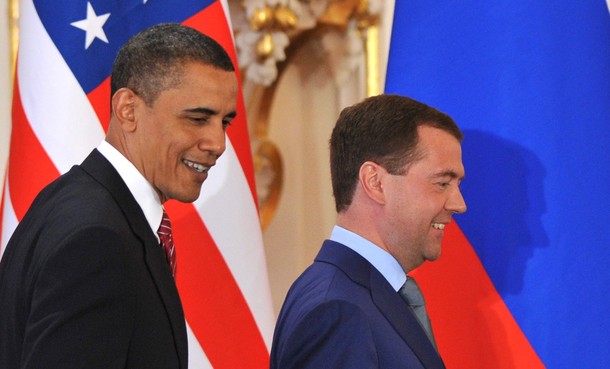
From Philip H. Gordon, the Department of State: When President Obama came into office less than six months after the Georgia war, U.S.-Russian relations were at their lowest point in years and perhaps in the post-Cold War period. There were other troubling events that had colored the recent past as well:
* Gas cutoffs to Ukraine
* A cyber-attack on Estonia
* Virulently anti-Western speeches from Putin including one in which he compared U.S. policies to those of the Third Reich
* The resumption of Russian strategic bomber air patrols along the Norwegian coast and as far away as the Caribbean
* President Medvedev’s threat to deploy Iskander missiles to Kaliningrad …
The Obama Administration’s new approach to Russia has produced considerable results that have advanced U.S. interests on a host of vital issues. Some of the most prominent include:
* The New START Treaty, which is the most comprehensive arms control agreement in nearly two decades. The Treaty cuts – by about a third – the nuclear weapons that the United States and Russia will deploy. It significantly reduces missiles and launchers. It puts in place a strong and effective verification regime. And it maintains the flexibility that we need to protect and advance our national security, to guarantee our commitment to the security of our Allies, and to move responsibly toward world without nuclear weapons.
* We concluded a lethal air transit agreement that has now permits, on average, two U.S. planes a day to fly over Russia carrying troops and supplies in support of the mission in Afghanistan. To date, over 275 flights have carried over 35,000 passengers and valuable cargo. Russia’s rail network has facilitated transit of more than 10,000 containers of supplies. And Russia’s willingness to consider NATO’s request for helicopters, spare parts, and training to the Afghan National Security Forces open the door to additional important security assistance. About 30% of cargo to Afghanistan goes through the Northern Distribution Network (NDN) and 60% of the NDN goes through Russia.
* Well over 100 meetings and exchanges have taken place under the auspices of the Binational Presidential Commission, bringing together over 60 Russian and American government agencies, not to mention multiple private sector and non-governmental partners. We have achieved concrete results:
* On security, we have agreed to dispose of enough weapons-grade plutonium for 17,000 nuclear warheads;
* On economics, American companies were the first to announce investments in Russia’s Skolkovo innovation center, while Russia just awarded a 50-aircraft tender for Boeing 737s worth $4 billion;
* On people-to-people cooperation, we completed in May our first ever youth basketball exchange in the United States and supported over 40 American cultural events in Russia.
* We are working on many other areas from the environment to terrorism.
Excerpts from remarks by Philip H. Gordon, Assistant Secretary of State for European and Eurasian Affairs, at the German Marshall Fund. (photo: Getty)
Image: getty%206%2018%2010%20Barack%20Obama%20Dmitry%20Medvedev.jpg
